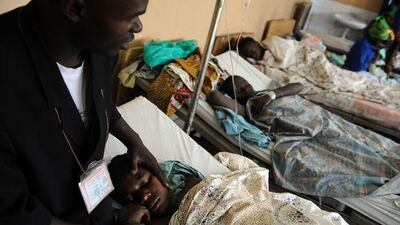NEW YORK // A report on atrocities committed in the eastern region of the Democratic Republic of Congo offers a catalogue of horrors from one of Africa's most lawless nations, describing civilians being hacked to death by machetes, gang-raped and having their throats slit.
The study, by the New York-based advocacy group Human Rights Watch, severely criticises the United Nations for being complicit in the abuses, as well as blaming the rebel militias and Congolese national forces for their brutality against civilians. The UN's peacekeeping force in Congo, known by its French acronym, Monuc, has been providing the notoriously ill-disciplined Congolese army with logistical and financial support as it committed its crimes against the general population of the eastern region, the report said.
The UN secretary general, Ban Ki-moon, spoke on Monday of the "highest priority" he attached to civilian protection, but deferred major decisions on the future of the mission to the Security Council, which will debate the DR Congo crisis today. The 183-page report details the killing of more than 1,400 civilians during the first nine months of this year as Congolese soldiers fought a Rwandan Hutu militia called the Democratic Forces for the Liberation of Rwanda (FDLR).
Titled "You Will Be Punished": Attacks on Civilians in Eastern Congo, the report describes soldiers and rebels conducting "vicious and widespread" attacks on civilians, accusing villagers of being collaborators and "punishing" them with brutal executions. Rebels and national forces are responsible for roughly equal numbers of the documented civilian deaths, the report says, burning thousands of homes, shooting fleeing villagers and tying victims together before slitting their throats.
It documents more than 7,500 sex attacks on women and girls, including gang rapes, capturing women for use as sex slaves, and one instance of FDLR fighters raping a nine-year-old girl and her mother, who later died from injuries sustained during the assault. Some of the atrocities took place while Congolese soldiers joined ranks with the army of neighbouring Rwanda in a three-month push against the FDLR, which includes leaders accused of participating in the 1994 Rwandan genocide.
After Rwandan troops left in March, the UN's largest and most expensive blue helmet force, Monuc, has backed the government operations against the FDLR with money - US$6 million (Dh22m) - and everything from tactical advice to food and fuel. Monuc chiefs have repeatedly said they did not have enough boots on the ground, with only 19,000 troops to stabilise a country the size of Western Europe. Eastern Congo alone has witnessed back-to-back civil wars from 1996 to 2002 that drew in neighbouring countries to plunder the nation's massive mineral wealth.
While the Congolese claim to have defeated the FDLR, analysts suggest that the rebels' command structure has been merely weakened and combatants have melted into the jungle and regrouped, making a total military victory unlikely. Meanwhile, the impact on civilians has been grossly disproportionate, the report said. For every rebel fighter disarmed, one civilian has been killed, seven women or girls have been raped, six houses have been torched and 900 people have been forced to flee their homes.
The report, echoed by similar concerns from the British-based charity Oxfam, comes as Congo's president, Joseph Kabila, is asking for a timetable for the withdrawal of the blue helmets. Security Council members are due to vote on renewing Monuc's mandate on December 21. In his monthly briefing to journalists, Mr Ban said Monuc had already suspended support for the Congolese army "when we have sufficient grounds that their military operations would be against international humanitarian law and international human rights law".
While the UN has withdrawn support to a division in the Nyabiondo area of North Kivu, Human Rights Watch urges the UN to go further and "immediately cease all support to the current military operation" and devise "a new approach to protect civilians". The advocacy group's researcher, Anneke Van Woudenberg, said the "single most effective" measure to halt further atrocities would be to arrest all Congolese army commanders known to have committed atrocities.
"The Security Council needs to provide UN peacekeepers in Congo with clear and concrete direction," she said. "Sending a group of experts and making clear to the Congolese army the conditions under which the peacekeepers will work with its troops can play a crucial role in ending abuses and ensuring that UN peacekeepers are not implicated in future atrocities." @Email:jreinl@thenational.ae


